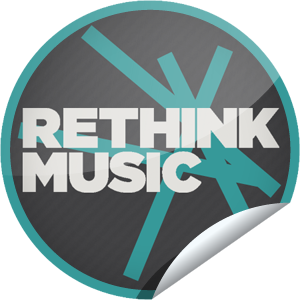 Since Napster was sued out of existence in 2001, the record industry has ruined digital music time and time again. The result has been to stifle innovation and creativity as the industry dug its own grave with respect to consumer support. We will never really know just how much music and culture suffered from their corruption, ineptitude and negligence. But now we can get a rough idea.
Since Napster was sued out of existence in 2001, the record industry has ruined digital music time and time again. The result has been to stifle innovation and creativity as the industry dug its own grave with respect to consumer support. We will never really know just how much music and culture suffered from their corruption, ineptitude and negligence. But now we can get a rough idea.
Anyone in the digital music world knows that record labels continue to sue competitors out of existence rather than negotiating a settlement and moving forward progressively (Grooveshark being the most recent example). Until now, this knowledge has been intuitive. But a new groundbreaking study by Rutgers law professor Michael A. Carrier offers stunning admissions by the world’s top music executives that they have been destroying digital music for a decade. Carrier is blowing the whistle loud to expose the culture-crushing tactics of a record industry hell-bent on saving its dying revenue streams. What’s incredible is how many of these smoking-gun admissions of the record industry’s practice of destroying music through litigation and intimidation continue to this day.
For the study, Carrier interviewed and anonymously quoted CEOs and VPs of major music and technology companies. All the major labels and nearly every digital music service worth mentioning from the days of Napster are represented here, with 31 top-ranking officers included as sources for the report. Even the infamous Hilary Rosen of the Napster-era RIAA makes an appearance. The 63 pages of the report are full of juicy, candid admissions that will make your jaw drop and the whole report is worth a read, but here are a few highlights:
• The labels shut Napster down just as filtering technology was being developed to weed out copyright infringing files and/or pay rights holders for use of their content — the same kind of software being developed and used now at YouTube. Had the labels continued to develop this filtering technology, it would be much more efficient and effective today at preventing copyright infringement. Worse, by banning p2p technology, labels just pushed the technology underground and it developed in a way to make it harder to apply such filters.
• The labels were very aware that tying a great single to a lackluster album of songs was akin to “selling 1 pound of shit in a 10 pound bag” and that one of Napster’s biggest lasting effects was to destroy the idea of bundling music in albums. However, they chose to ignore this sea change in music consumption because it ran directly counter to their business model. That the album was not sunsetted for the single continues to be pure willful ignorance.
• In the face of digital music, the labels used litigation as their primary business model. Their attitude was that they were not going to license their content to anyone. This strategy, akin to “not negotiating with terrorists”, (indeed file sharers were labeled as “pirates”) meant that no “legitimate” digital music service would emerge until the iTunes store. Steve Jobs made it happen through personal connections, and the labels basically handed the digital download industry over to Apple’s “walled garden” media ecosystem. Prior to that, the iPod drove the demand for music file sharing through the roof. By not negotiating with digital music services, the industry encouraged the “underground” to flourish an eventually empowered Apple to unseat the music retailers. By the time “legitimate” means of acquiring music emerged, the consumer base was already well used to free, unfettered access to music.
• The CD retail shops basically committed suicide. They were complicit in the labels’ litigious fight against digital music innovators. The labels saw the retailers as their customers, not the listeners themselves. After all, the retailers bought 90% of record industry products. Because the labels would allow no viable digital music alternative, an entire generation learned to consume digital music without industry consent. As a result, retailers essentially evaporated when the industry finally began throwing its weight behind the sanctioned digital music retailers as mentioned above.
• Much of the industry’s irrational behavior can be explained by the “Innovator’s Dilemma”, a somewhat obvious idea that large corporations are dis-incentivized to pursue new innovations that threaten existing business models. Just to demonstrate how out-of-whack executives were with reality, here’s an excerpt from the study:
…before iTunes offered 99-cent singles, one label was “adamant” that “the single should be priced at $3.25.” The reason was that if customers bought “two or three,” then they would “make up lost sales on the album by the sale of singles.” The respondents reaction was: “You’re out of your mind” since “people aren’t going to pay $3.25 for a single.”
• The business structure of the record labels was set up for short-term success in deference of any long-term thinking. Political power struggles were common. In short, the bureaucracy of these labels, themselves consolidated into larger corporate bureaucracies, lacked the ability to innovate in the first place. The result was that litigation was the only way to sustain the business model. Technology startups simply could not go on functioning with the massive legal costs associated with defending a record label lawsuit, especially when all the labels ganged up on one company as they often did (and still do).
• We all know that the RIAA terrorized consumers with lawsuits alleging personal infringement of copyright (remember, retailers were the labels’ customers, not the public, so why should they care about offending the public?). What many don’t realize is how CEOs of tech companies were terrorized with the same allegations of personal infringement in addition to having their companies sued out of existence. Additionally, because of the obscene statutory fines associated with willful copyright infringement, this created ridiculous situations, such as Limewire being sued for statutory damages of $75 trillion, which is more that the GDP of the entire world.
• The litigious affront by labels had a real negative impact on the economy. As it sued digital music services out of existence, venture capital for any new project was hard to come by. This created a chilling effect around digital music services that persists to this day. It’s hard to convince investors to support a project when in the past they have been personally sued for willful copyright infringement simply for investing in a digital music product. Today we have very few compelling digital music services as a direct result of the industry’s approach to using litigation as a business model.
• The report does more than dispel myths about “piracy”, it clearly shows the record industry is to blame for not only its own downfall, but the downfall of music itself. The loss of innovation and venture capital was certainly a blow to society at large, but the effect of this corrupt crusade on the music itself was equally tragic. Though hard to quantify, some of the “magic of music” as it were has been lost, or at the very least transformed irrevocably by the willful negligence of the music industry. Not mentioned directly in the report is the mountains of money denied to musicians themselves, the ultimate enablers of the industry who so often get screwed by it. Fortunately, all this chaos has spurred the public to adopt radical new business models — patronage and crowd funding chief among them — and we are finally starting to “bounce back” from the damage record labels have inflicted on the culture and economy of music.
It has never been more clear that despite bringing music to millions of people across the globe, the record industry has had a net negative effect on music, particularly in the last decade. This being one of the central theses of my upcoming book, I have overjoyed to have this report as a smoking gun source for what anyone in the digital music world knows intuitively to be true. Read the report to see what I mean.


